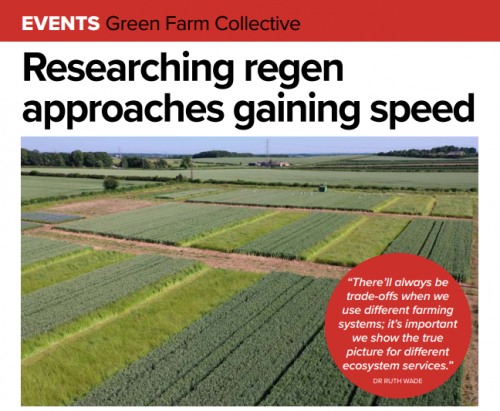The July 2025 edition of CPM Magazine spotlights new research into regenerative agriculture, featuring both University of Leeds lecturer Dr. Ruth Wade and SHOWCASE lecturerDr. Millie Hood from the University of Reading. The article, “Researching regen approaches gaining speed”, reports on the Green Farm Collective Conference, where researchers shared emerging evidence on the benefits and trade-offs of regenerative farming systems.
SHOWCASE lecturer Dr. Millie Hood focused on the frost-tolerance of different cover crop species and their potential to enhance biodiversity, improve soil health and reduce glyphosate use. Her trials, co-designed with 16 farmers and recruited with the help from another project partner (LEAF), revealed notable increases in spider populations (26%) and earthworm numbers (up to 66%) in plots that were cover cropped, including in the subsequent cash (cereal) crops. However, conclusions about differences between mixes have been harder to make with the frost-sensitive cover crop mixes from Oakbank decaying gradually over winter, reducing plant cover before planting, but yielded only moderate benefits for spiders and decomposition.
Millie emphasised that “co-design comes up with more creative solutions that are usable, while also creating a sense of community between people with shared goals, including farmers and researchers,” underlining the value of participatory approaches in agricultural research.
Alongside this, Dr. Ruth Wade presented findings from a large-scale, multi-year University of Leeds trial comparing seven farming systems, from conventional to varying combinations of regenerative principles such as minimal soil disturbance, increased diversity and livestock integration. Her results showed both benefits, such as increases in soil organic carbon in regen plots, and challenges, including weather-related crop establishment problems and higher nitrous oxide emissions.
By featuring both Ruth’s and Millie’s work, the CPM Magazine article highlights how combining controlled trials with farmer-led, co-designed experimentation is helping build a robust, practical evidence base for regenerative agriculture in the UK and across Europe.
Read the full article here.
Image: Screenshot from CPM Magazine article
